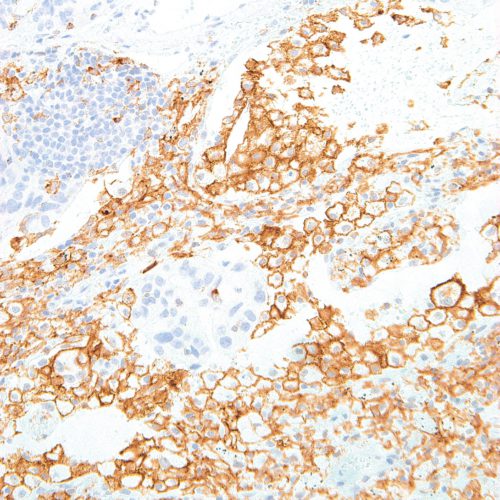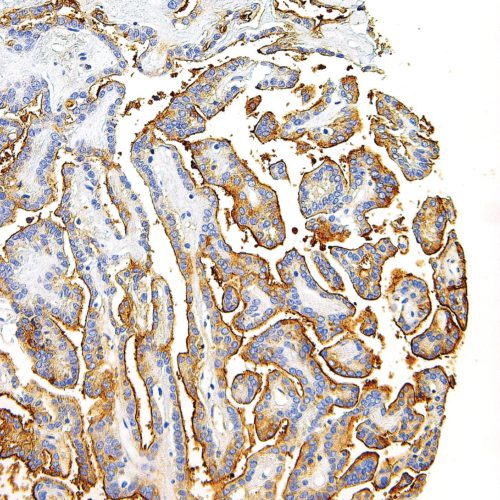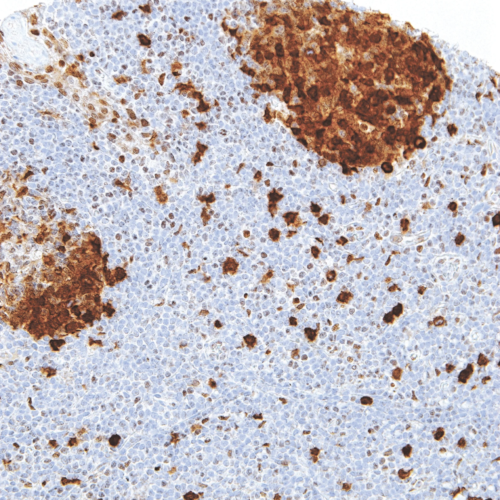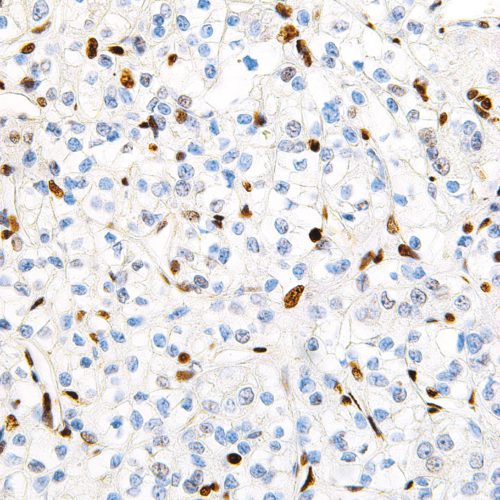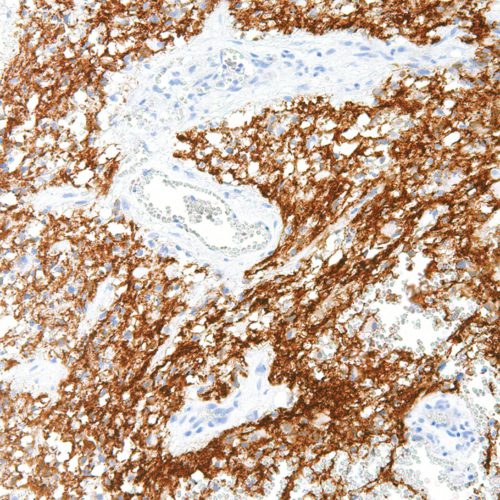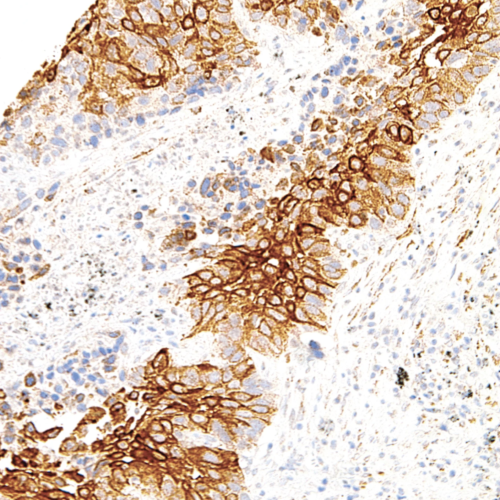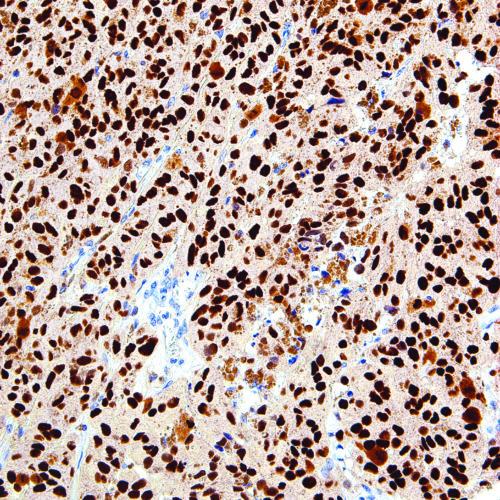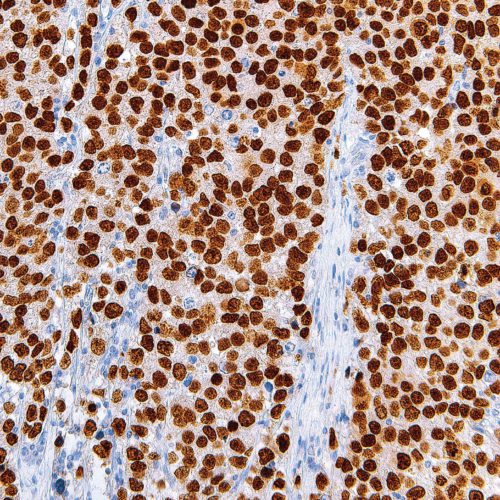High quality products to support Pathologists and Biological and Environmental Scientists
GeneAb™ TIM3
$175.00 – $860.00T-cell Immunoglobulin and Mucin-Domain-Containing Molecule-3 (TIM3) is present on T-helper type 1 lymphocytes and other immune cells including dendritic cells and natural killer cells. TIM3 is overexpressed in CD4 tumor-infiltrating lymphocytes, including those with non-small cell lung cancer associated with poor prognoses. TIM3 has recently emerged as a potential target for cancer immunotherapy.
GeneAb™ Thyroglobin
$95.00 – $480.00Thyroglobulin is a precursor to the thyroid hormones T4 and T3 and is present in the thyroid follicular cells. Nearly all thyroid follicular carcinomas stain for thyroglobulin and sometimes produce a focal staining pattern. Conversely, poorly differentiated carcinomas and non-thyroid adenocarcinomas do not stain for thyroglobulin, therefore this Thyroglobulin IVD antibody is a useful diagnostic tool for recognizing papillary and follicular thyroid carcinomas. A panel of Anti-Thyroglobulin and Anti-Calcitonin is useful for identifying medullary thyroid carcinomas, whereas a panel of Anti-Thyroglobulin and Anti-TTF1 is useful for distinguishing between primary thyroid and lung neoplasms.
GeneAb™ Thymidylate Synthase
$125.00 – $620.00Thymidylate Synthase (TS) is a crucial enzyme responsible for the synthesis of 2′-deoxythymidine-5′-monophosphate (dTMP) a precursor for thymidylate which is necessary for DNA replication and repair from 2′-deoxyuridine-5′-monophosphate (dUMP). In terms of cancer, TS is an important target for cancer treatment as the inhibition of TS and therefore nucleotide synthesis necessary for cell growth has shown to be a vital part for successful treatment against colorectal, pancreatic and breast cancers.
GeneAb™ TFE3
$100.00 – $490.00Transcription Factor E3 (TFE3) is a transcription factor that binds to the MUE3-type E-box sequences involved in TGF-β signalling. Anti-TFE3 staining is the most sensitive and specific indicator of Xp11 translocation renal cell carcinomas. Since alveolar soft part sarcoma (ASPS) is characterized by a specific chromosomal rearrangement resulting in a chimeric transcription factor (ASPSCR1-TFE3), this TFE3 IVD antibody is also a useful diagnostic tool for recognizing ASPS.
GeneAb™ Tau
$75.00 – $280.00Tau proteins are abundant in neurons of the central nervous system, and function in microtubule stability and organization. Defects in Tau functioning and aggregation of these proteins have been clinically linked to a number of neurodegenerative disorders including Alzheimer’s disease, Parkinson’s disease, Pick’s disease (PiD), progressive supranuclear palsy (PSP), cortical basal degeneration (CBD), and frontotemporal dementia with parkinsonism linked to chromosome 17 (FTDP-17).
GeneAb™ TAG-72
$95.00 – $370.00Tumor-Associated Glycoprotein 72 (TAG-72) is a glycoprotein found on the surface of many cancer pathologies. Anti-TAG-72 can be useful for detecting some adenocarcinomas and non-neoplastic tissues. This diagnostic grade TAG-72 IVD antibody is useful for identifying adenocarcinomas in positive staining, but in mesotheliomas no staining is observed.
GeneAb™ SOX10
$100.00 – $415.00SRY (Sex Determining Region Y)-Box 10 (SOX-10), also known as transcription factor SOX-10, is a nuclear transcription factor that acts in regulation of embryonic development and in the specification and differentiation of cells of melanocytic lineage. SOX-10 is diffusely expressed in neurofibromas and schwannomas, and mutations in the SOX-10 gene are linked to Waardenburg-Shah and Waardenburg-Hirschsprung disease. Anti-SOX-10 has been shown to be sensitive for conventional, spindled, and desmoplastic melanoma, and has been used to detect metastatic melanoma and nodal capsular nevus in sentinel lymph nodes.
GeneAb™ SALL4
$75.00 – $330.00Sal-Like Protein 4 (SALL4), is a zinc finger transcription factor found in germ cells and human blood progenitor cells, with functional involvement in modulating Oct-4 to maintain embryonic stem cell pluripotency. SALL4 is a useful marker for acute myeloid leukemia, B-cell acute lymphocytic leukemia, intratubular germ cell neoplasia, seminomas/dysgerminomas, and yolk sac tumors (both pediatric and postpubertal). Anti-SALL4 is used to detect embryonal carcinomas, hepatocellular carcinoma (HCC), gliomas, ovarian primitive germ-cell tumors, choriocarcinomas, spermatogonia, teratoma, gastric cancer, breast cancer, and lung cancer. Expression of SALL4 is often associated with poor prognosis in HCC, and with metastasis in endometrial cancer, colorectal carcinoma, and esophageal squamous cell carcinoma.
